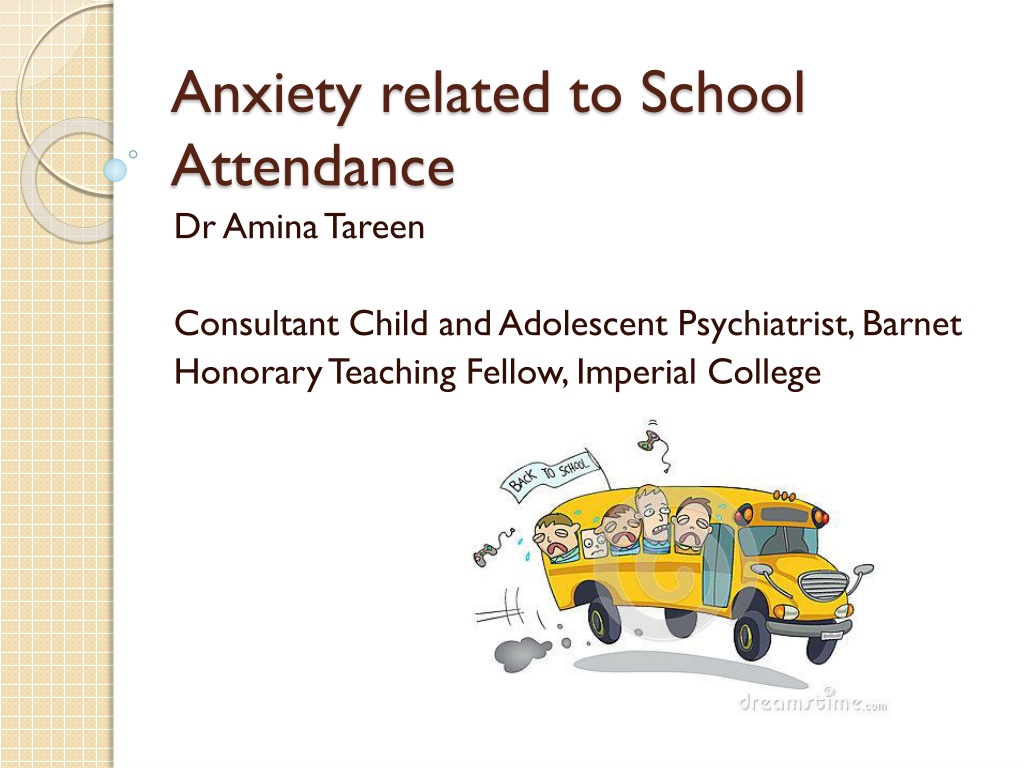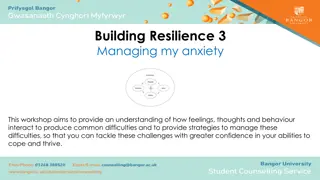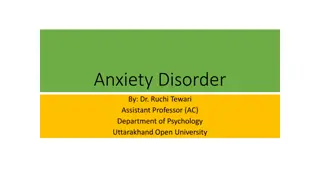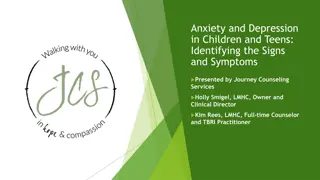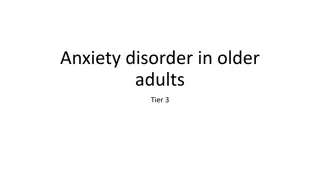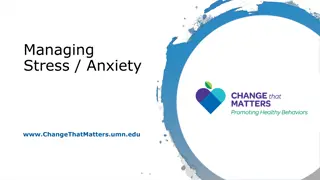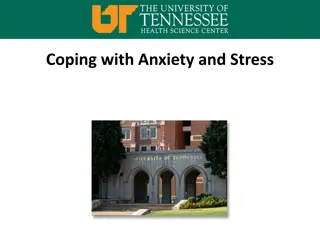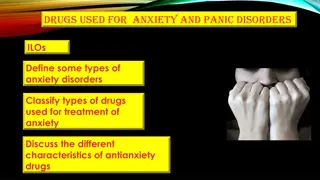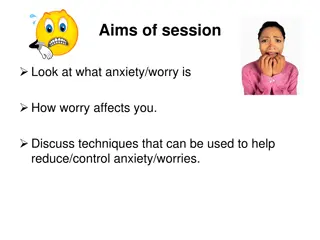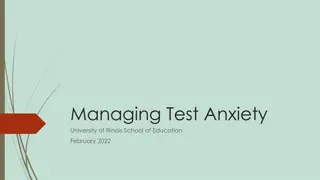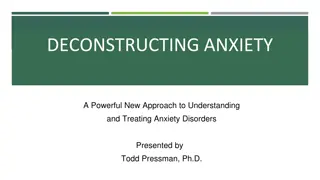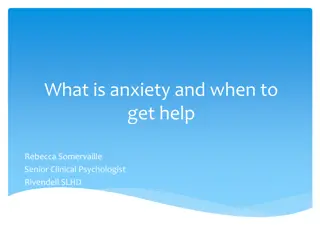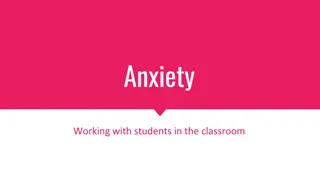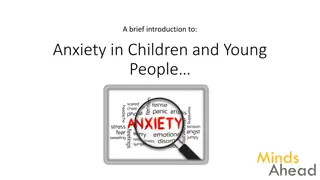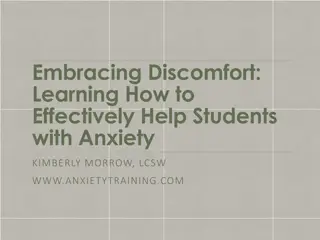Understanding and Managing Anxiety in School-Going Children
Dr. Amina Tareen, a Child and Adolescent Psychiatrist, discusses the importance of managing anxiety in school attendees. She emphasizes that anxiety is common, affects daily functioning, and can be supported by parents through self-help resources. The presentation covers the science, effects, causes, and cycles of anxiety, illustrating how thoughts and behaviors impact anxiety levels. Strategies are offered to reduce anxiety and stay in challenging situations longer for effective coping.
Download Presentation

Please find below an Image/Link to download the presentation.
The content on the website is provided AS IS for your information and personal use only. It may not be sold, licensed, or shared on other websites without obtaining consent from the author. Download presentation by click this link. If you encounter any issues during the download, it is possible that the publisher has removed the file from their server.
E N D
Presentation Transcript
Anxiety related to School Attendance Dr Amina Tareen Consultant Child and Adolescent Psychiatrist, Barnet Honorary Teaching Fellow, Imperial College
Recall the most recent time you felt anxious Bring it alive again in your mind Recall the situation Recall your thoughts Recall your feelings Recall the sensations in your body
Why focus this talk on managing anxiety Very common condition Impacts on functioning Parents can help young people recover from mild to moderate anxiety using self help resources, and not necessarily need formal therapeutic support.
Anxiety cycle Situation: noise at night Thought: It is a burglar Feeling: anxiety Body: heart beats fast, chest tight, mouth dry Behaviour: Hide under covers
Alternative cycle Situation: noise at night Thought: It is the cat Feeling: annoyance at being woken Body: a bit restless Behaviour: turn over and go back to sleep
What does the science tell us Anxiety is physical as well as psychological Anxiety makes us want to leave a situation flight If we stay in the situation long enough, anxiety will come down (the curve) Anxiety is a horrid feeling so we need help to reduce it to bearable levels, so we can stay in the situation long enough
Early signs Physical symptoms on week days Repeatedly ask to visit the school nurse Common physical symptoms include headaches, stomach aches, nausea, or diarrhoea. Also tantrums, inflexibility, separation anxiety, avoidance, and defiance. More time in their rooms and do less than they did previously
Useful Strategies/What works Relaxation training/worry surfing Breaking it down into more manageable steps Worrying thought to more realistic thought Coping self statements Problem solving
What works 1 Doing something to make yourself feel better Relaxation training Breathing/visualisation Worry surfing
Tips for smaller steps Do it gradually. Start at the point where they can manage and where their anxiety is a 2 out of 10. Help them stay at that step long enough for anxiety to come down. Repeat again and again until confident. Help them do realistic thinking before, during and after the step. Don t be discouraged by setbacks. Get them to self praise and you praise also.
What works 3 Catching the thought (important to write it ) Looking for the evidence
What works 3 (contd) Analysing What has happened before in similar situations What has happened to other people What is most likely to happen
Sample in practice I am worried about going back to school after the summer break as I will not fit in Some other people are also likely to have similar worries but there are some who will just go in and be fine Last year I did not fit in until the October half term Most likely the first few weeks will be really hard but it is likely to get better
What works 4 Coping self statements Encouraging- not telling off Stroking, not poking
Sample coping statements I felt really anxious before my mock exams but managed to get in for 5 out of 10 and it got easier towards the end. My teachers and parents were pleased and so was I. I found it so hard to go to school on Monday but by Thursday it felt easier. I felt anxious but also proud of myself. The morning lesson was the worst but by period 3 I felt better I can manage this
What works 5 Problem solving Write down the problem Brainstorm all possible solutions. Write down pros and cons of each Choose one and try it See how it worked and tweak it if it didn t
Sample problem It is very hard to get into school on Monday morning Possible solutions: Don t go to school at all Skip Monday and go on Tuesday Go in later on Monday Arrange to do something on Monday which helps me feel better like helping junior class in Learning support
Pros and Cons for not going Monday Pros Anxiety will go down I won t have to do Drama I will have a 3 day weekend Cons I will feel bad that I did not manage Tuesday will be harder, the new Monday My friends will ask why I was not there I will miss out on lessons and break activities
Summary Anxiety leads to avoidance The two A s are friends but they are not your friend Catch avoidance patterns early Use worry surfing/relaxation training, step ladders, realistic thinking, remembering successes and problem solving Anxiety is infectious and bounces between parents and children
Practice task-smaller steps An 11 year old says they don t want to go to school . This happens two weeks after secondary transfer and there are no obvious stressful incidents Break down the task of getting back to school into smaller tasks
Practice taskanswering back worrying thought Remember the last time you were anxious Working in pairs, go through these steps -write down thought What has happened to you or others before What is most likely to happen
